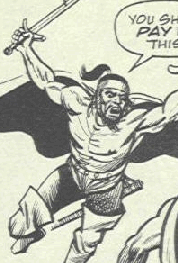
WALKERS
MEMBERSHIP: Balor, Bran, Cormac, Gael, Gamael, Gurien, Gwend, Herne, Karadoc, Mordred, Scartac, Vortigen
SUBDIVISIONS:
Evil Walkers (Balor, Cormac, Gurien, Karadoc, Mordred, Scartac)
Proud Walkers (Bran, Gael, Gamael, Gwend, Herne, Vortigen)
AFFILIATIONS: Presumably the Walkers are some variation
of the Pendragon spirits associated with the
Knights of Pendragon.
The "evil"
Walkers were agents of
Necromon and all of his allies, and
enemies of the Proud Walkers,
Merlyn, Arthur Pendragon, the Black
Knight/Dane Whitman, Captain Britain, and the forces of Camelot.
The opposite is true for the Proud Walkers.
BASE of OPERATIONS: (Proud Walkers) Otherworld , (others) Netherworld associated with Otherworld; All originally dwelled on Earth
FIRST APPEARANCE: Mordred appeared way back
in: The Black Knight#1 (May, 1955, Atlas Comics), and in Marvel
Comics in: Marvel Super-Heroes II#17 (November, 1968).
Vortigen appeared and the concept of the
Walkers was mentioned in: Hulk Comics#6/2 (UK) (April 11, 1979).
The surviving Walkers appeared en masse in:
Hulk Comics#61/2 (UK) (May 1, 1980)
HISTORY: Originally, there were twelve Walkers: Men of power who perceived the old paths, or "ley lines," connecting the points of magic from long before the dawn of time. The Walkers passed their knowledge onto those men wise enough to understand, many of whom became the druids. The Walkers also created routes from Earth to the realm known as Otherworld, usually by way of underground tunnels, allowing the inhabitants of both worlds to mingle together.
However, six of the twelve Walkers were corrupted by the forces of darkness. They created false paths which led men to madness and death, usually via black magic. People became mistrustful of the old way, mainly because of these six evil Walkers. Witches were burned, creatures of Otherworld like faeries, elves, trolls, and dragons were shunned and scorned. The old paths were discarded, and a rift appeared between the two worlds. The remaining six Walkers, the noble or Proud Walkers, gradually withdrew from Earth, returning to Otherworld. The evil Walkers came to dwell in the Netherworld bordering on Otherworld.
In the modern era, Necromon, the leader of Netherworld, sought to overrun Otherworld. He realized that the forces of Camelot would rally against him, and so he sought to eliminate some of their greatest warriors. He erased the memory of Captain Britain, and sent his Mordred, one of the evil walkers to eliminate the current Black Knight. The Knight located the amnesiac Captain Britain, and the two were assisted against the Trolls of Netherworld by Vortigen, one of the Proud Walkers. Vortigen helped Braddock regain his memory, and led the two in a quest to Otherworld. In the course of the journey, losses occurred on both sides, but ultimately the Proud Walkers were gathered to fight against their surviving evil brethren. The forces of Necromon were defeated and the evil Walkers were either slain or incapacitated. Camelot was destroyed by the death-throws of Necromon, but Vortigen brought everyone to his castle to build a new Camelot. Presumably the Proud Walkers either dwell there, or have separated and returned to their homes.
COMMENTS: Created by Dez Skin, Steve Parkhouse, Paul Neary, and John Stokes.
The history of the Walkers is detailed in Captain Britain Summer Special 1980/4.
The credits for the story are given in that same issue in the second feature.
Thanks to Greg O and Will U for providing background info on some of the Walkers.
William contends that the Walkers are the crew of Bran. Most of the Walkers are actual figures, but none of them lived at the same time as Bran's journey. Vortigern, for example, was slain by Uther Pendragon around 515 AD, at least a thousand years after Bran would have been lost in Otherworld. This is like putting Ronald Reagan and Robin Hood on the Monitor and the Merrimac. In none of my sources are Bran's crew named, but I assume that Marvel picked the names when they continued the story.
Clarifications:
No known connection to:
Vortigen is also referred to as the Walker, and has no connection to:
Balor has no known connection to:
Gael has no connection to:
EVIL WALKERS

Balor served as the lieutenant to
Scartac, and was second-in-command to Necromon's armies. He, like
Scartac, made the mistake of assaulting Vortigen while he was
grief stricken over the death of Moondog. Balor attempted to
avenge the death of Scartac, but Vortigen caught his blade in his
bare hand and dispatched him with a single sword swipe.
--[Hulk Comic#45/2(mentioned)], 62/2 ([45/2, 59/2, 61/2], 62/2
mythological/historical info on Balor
(Will):
Real name Yspadden, (c. 410-465 AD) was a Celtic
Chieftain who gave all suitors for the hand of his
daughter, Olwen, extremely impossible challenges to pass in order
to win her hand. Of course, all the suitors who tried failed. It
is probably because of this imprisonment of his daughter that he
was compared to the Fomorian Balor. Apparently, he did this to
keep from acquiring a son-in-law that might depose him. Culhwch,
cousin of King Arthur, however, overcame all these challenges and
returned and killed Balor and all his allies.
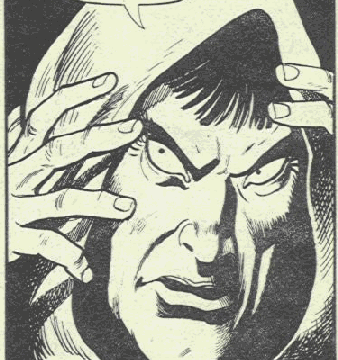 Cormac, the Sword-Master, took up the fight after the heroes
first escaped Mordred. His trolls captured Moondog, and used him
to lead Vortigen into a trap. He was a master swordsman, even
with both arms simultaneously, in addition to his powers of
mesmerism and telekinesis. He nearly killed Vortigen when he was
weakened by the loss of the Rowan Staff, but with a distraction
from Moondog, Vortigen temporarily dispatched him by throwing him
into his own magic field of force. When Cormac returned, the
Black Knight had gained the sword Excalibre from the Lady of the
Lake. Cormac mesmerized and immobilized the Knight, but the sword
came to life, animating the Knight to cut off Cormac's sword
hand.
Cormac, the Sword-Master, took up the fight after the heroes
first escaped Mordred. His trolls captured Moondog, and used him
to lead Vortigen into a trap. He was a master swordsman, even
with both arms simultaneously, in addition to his powers of
mesmerism and telekinesis. He nearly killed Vortigen when he was
weakened by the loss of the Rowan Staff, but with a distraction
from Moondog, Vortigen temporarily dispatched him by throwing him
into his own magic field of force. When Cormac returned, the
Black Knight had gained the sword Excalibre from the Lady of the
Lake. Cormac mesmerized and immobilized the Knight, but the sword
came to life, animating the Knight to cut off Cormac's sword
hand.
The heroes left him in the woods to continue their journey
--Hulk Comic#16/2 (17/2-19/2
mythological/historical info on Cormac
(Greg and Will):
Cormac likely comes from Cormac Mac Art (or Cormac Mac Airt) who
was a legendary Irish king (who R.E. Howard also wrote a few
stories about incidentally). He was son of
Art and grandson of Conn cetchatlach.
Sometimes called the Irish Solomon, his reign preceded King
MacCon, and is said to have possibly been somewhere around
230-265 AD. He vanished for several months in 248 AD, when the
god Manannan abducted Cormac's wife and children in lieu of an
old reneged payment. Cormac followed the god back to Tir
Tairngiri where the god seemed to be impressed by his daring and
returned his family. Manannan gave him mystical objects of
great value to return to Ireland. Cormac employed these gifts
from the sea god Manannan Mac Lir during his prosperous rein, a
golden cup that broke when three lies are spoken over it and only
three truths could make it whole, and a musical silver branch
hung with golen apples that healed the sick and the lame when
shook over their heads.
He is said to have lost an eye in a battle with Cellach of the
Terrible Spear who sought revenge for Cormac's son raping his
daughter. Cormac died from choking on a fishbone in 266 and was
related through his brother to St. Brigid (453-523).
OR
Cormac comes from the hero Cormac (c. 525-540), son of the king
of Ulster, Conchabar Mc Nessa, who voluntarily went into exile
with the deposed king of Ulster, Fergus Mac Roth, due to disgust
at his father's treachery. He went to return home after his
father named him his successor (Gaels and other Celts didn't
always follow primogeniture like the Britons) but a druidess
warned he would die if he went home. Cormac heard the notes of a
magic harp and fell asleep by the side of the road where he was
killed in revenge for sleeping with the harpist's wife (the Celts
were a lusty, adulterous lot it seems!).
Will's version is slightly different, so I'll list it
separately:
Cormac was sent by Conchorbor, king of Ulster, with his father
Dubthach and Fergus to Scotland to provide safe return to the
Irish exiles Deirdre, Ardan and Ainnle, but Cormac murdered the
exiles on their return. Upset by the turn of events, Cormac,
Fergus and Dubthach made a vow to remove Conchorbor from the
throne and formed an alliance with Conchobor's enemies, Ailill
and Medb of Connacht. Conchorbor was slain and Cormac became the
next king.
He dwelled within a mountain fortress, and convinced the giant Gargantua to be his agent. He must have been around for the final battle, unless he had already been dealt with, but I never saw him.
--[Hulk Comic#45/2] ([49/2, 50/2, 60/2-63/2]
In Hulk Weekly#55, Necromon tries to convince
Merlyn the Six are at the gates of Camelot, and manifests images of them. The
faux Cormac introduces all six - he calls one Gurien, although that one is later
shown to be Balor. So by deduction, the one who he seemed to call Balor, is
Gurien.
--Loki
mythological/historical info on Gamael
(Will):
Gamael (Gamal) and Gurien- (c. 1699 BC) were sons of Milesius,
leader of the Gaels (see Gael below). They drowned at sea as the
Chieftain was fighting storms preventing them from landing on
Eire.
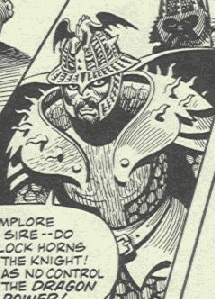
Karadoc controlled an army of dragons, including Ashtoroth, Khârad Dur and Sarafand. He often rode one of his dragons into
battle. He was inadvertently incinerated by Kharad Dur after
being blinded by Jackdaw.
--Hulk Comic#45/2 ([46/2, 47/2], 48, 55, 57
mythological/historical info on Karadoc
(Will):
Karadoc (Caradawc) (c. 37 BC) was son of Bran the Blessed, son of
Leir. he was also considered a descendant of Aeneas, the Trojan
prince whose grandson, Brut, was eponymous ancestor of the
Britons. Caradawc was also considered an ancestor of both
Uther Pendragon and Igraine, the parents of King Arthur.
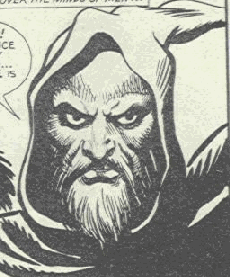
Mordred, usually spelled Modred in this story, also known as
the Lore-Master, was sent to Earth by Necromon to slay the Black
Knight. He was a powerful sorcerer, who used both human pawns and
his own human agents to assist him. He summoned a powerful
Hellraven, enthralled an entire village, transformed the witch
Sara Mumford into a lifeless tree, and set Merlyn on fire. He was
weakened and driven mad when the Black Knight used Excalibre to
turn his own spell back on him.
--Hulk Comic#1/2 (3/2-5/2, 7/2, 8/2, [9/2], 10/2, 11/2,
[12/2-16/2], 26/2-30/2
- see the full profile on Mordred the Evil
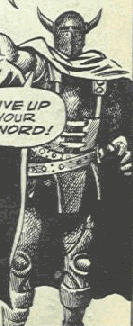
Scartac was the warlord of Necromon's armies, served by his lieutenant, Balor. He made the mistake of confronting Vortigen just after his friend and ally Moondog had been killed. Vortigen split his head with his sword.
--[Hulk Comic#45/2(mentioned)], 62/2 ([45/2, 59/2, 61/2], 62/2
mythological/historical info on Scartac
(Will):
Scartach (c. 510-540 AD) was a Celtic priestess who Cu Chulainn
went to in order to prove his worth. He however ended up seducing
her sister, Aoife who bore him a son, Conall.
PROUD WALKERS
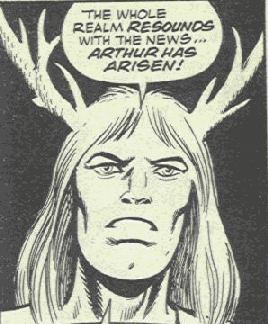
Herne the Hunter was the first of the Proud Walkers to answer the final
call back to Camelot. He found Vortigen, who had just made a new
Rowan Staff, and the two assembled the remaining four. He has
antlers.
--Hulk Comic#60/2 (61/2, [62/2, 63/2]
mythological/historical info on Herne (Will):
Herne was a follower of Cernunnos who started the
first Wild Hunt during the reign of King Arthur (r. 410-465).
(Greg):
Herne I believe is a reference to Herne the Horned of Herne the
Hunter, a Celtic deity of the hunt, sometimes seen as synonymous
with the Wild Huntsman.
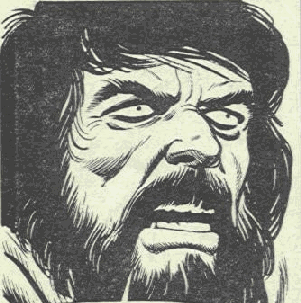 Vortigen, also known as the Walker, came to the
assistance of the Black Knight and Captain Britain when they were
first attacked by Mordred. He enabled Britain to recall his past
and led them on the quest to Otherworld. His power was halved
when his Rowan Staff was shattered by the Iron Ogre, and he was
forced to leave the heroes to forge another so he would be
prepared for the final battle. He returned in time to slay the
last of the two evil Walkers, Balor and Scartac. After the
battle, he volunteered his own kingdom to replace the fallen
Camelot. He was a large and powerful man, with undefined mystical
powers. His strength and powers were dependent on and focused
through his Rowan Staff. At his peak he was by far the most
powerful of the Walkers. He was often accompanied by his pet
wolf, Lupe.
Vortigen, also known as the Walker, came to the
assistance of the Black Knight and Captain Britain when they were
first attacked by Mordred. He enabled Britain to recall his past
and led them on the quest to Otherworld. His power was halved
when his Rowan Staff was shattered by the Iron Ogre, and he was
forced to leave the heroes to forge another so he would be
prepared for the final battle. He returned in time to slay the
last of the two evil Walkers, Balor and Scartac. After the
battle, he volunteered his own kingdom to replace the fallen
Camelot. He was a large and powerful man, with undefined mystical
powers. His strength and powers were dependent on and focused
through his Rowan Staff. At his peak he was by far the most
powerful of the Walkers. He was often accompanied by his pet
wolf, Lupe.
--Hulk Comic#6/2, (named) 13/2 (7/2, 8/2, [9/2], 10/2-18/2, 60/2, 61/2, [62/2], 63/2, Mighty World of Marvel#13
Note: In the letters page of Captain Britain II#10, it is confirmed that Vortigen was one of the people at Merlyn's funeral in MWOM#13.
Vortigen's name is similar to Vortigern, who preceded Arthur Pendragon as King. I'm not sure if there is any connection there, either. Vortigern has not appeared in Marvel Comics.
mythological/historical info on Vortigern
(Greg):
Vortigern (c. 430 AD). His name comes from the vernacular term
"tigernos" recalling the Roman occupational
"superbus tyrannus" meaning proud tyrant. He was
seneschal to King Constantine of Britain, the grandfather of King
Arthur.
Vortigern seized the throne on Constantine's death. He sought to
build a castle/tower stronghold, but it kept collapsing. Merlin
revealed the lake under under the tower. A seer told Vortigern he
had to consecrate the ground with the blood of a man with no
mortal father, thus he tried to kill Merlin. This prompted
Merlin's famous vision of the white dragon and the red dragon
battling, symbolizing the warring peoples of Britain. Alternately
seen as a defender of the realm or an employer of foreign
mercenaries such as Jutes and later the Saxons whom he hired to
battle the Jutes which betrayed him.
Vortigern was slain by Uther Pendragon (Arthur's father), who
usurped the throne in his place.
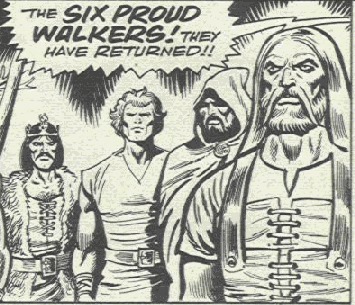
The last four, Gwent,
Gamael, Bran, and Gael, made it back in time for the final battle, and
helped the forces of Camelot route Necromon's army.
--Hulk Comic#61/2 ([62/2, 63/2]
mythological/historical info on Bran
(Greg):
The first Bran, son of Febal (a Celtic chieftain), is the hero of
one of the most famous mythical Celtic sea voyages (stories which
the Irish and their storytellers had a great fondness for). Bran
fond a magical silver tree branch with white flowers and showed
it to his kinsmen. A mysterious woman suddenly appeared and told
the assembly of the wonders to be found on the otherworldly
islands beyond the sea. With twenty seven of his kinsman Bran set
forth travelling to many strange places including the island of
Manannan Mac Lyr, the Isle of Merriment, and the Isle of Women
(guess what they did there?).
According to William: Bran's crew was distracted by a water-goddess they
pursued back to the Otherworldly land of Tir inna mBan. The
goddess's father, Manannan, invited them to stay and indulge in
their paradise for one year, but when Bran and his crew returned
home, they discovered they had been tricked. One man jumped to
shore, but as his foot touched earth he crumbled to dust. Bran
and his crew
called a shore and heard that the only Bran they knew was the son
of Leir who had died in 43 BC, five hundred years before (placing
this story around the time of King Arthur, and their initial
departure around 500 BC). Realizing they could not return home,
Bran and his crew returned to Tir inna mBan.
The story also has parallels with Odysseus in the court of Circe.
While he was on her island, time slowed for him why many more
years passed in Ithaca.
ALSO (per Greg)
Bran "the Blessed" on the other hand
was son of the sea god Lyr (or Lir, presumably the same as Leir)
which makes him the brother or at least half-brother of Manannan
Mac Lir. Apparently some sort of otherworld god Bran also had
duties as a king in Britain. After a big feud, caused by giving
his sister as a wife to the Irish king Matholwch without her
half-brother Efnisien's consent, Bran was slain by a poisoned
arrow and only seven of the British army survived though they
slew every Irishman. On his deathbed he told his followers to cut
off his head which was still capable of speech on the voyage
home. Buried facing Europe to ward off foreign invaders King
Arthur is said to have called upon the magic of Bran's head for
its power. In light of this last bit I would guess the first Bran
is likely the Proud Walker, and this other one a god for which he
was named.
mythological/historical info on Gael
(Greg and Will):
Gael (c.2350-2200 BC) was son of Niall & Scota and eponymous
leader of the Gauls, a people of the Iberian peninsula, that
invaded and conquered Ireland. He was an ancestor of Mil (or
Milesius) , who, in 1699 BC, led them. In revenge for the death
of Mil's nephew Ith, the Gaels reclaimed the island from the
Tuatha du Danann in the same way the Tuatha seized it from the
Formor, and became the ancestors of the modern day Irish peoples.
mythological/historical info on Gamael
(Will):
Gamael(Gamal) and Gurien- (c. 1699 BC) were sons of Milesius.
They drowned at sea as the Chieftain was fighting storms
preventing them from landing on Eire.
mythological/historical info on Gwent
:
Gwent (c. 430-450 AD) was the daughter of Cunedda, ruler of the
Votadini tribes and maternal grandmother of King Arthur.
Last updated: 02/14/13
Any Additions/Corrections? please let me know.
Non-Marvel Copyright info
All other characters mentioned or pictured are ™ and © 1941-2099 Marvel
Characters, Inc. All Rights Reserved. If you like this stuff, you should check
out the real thing!
Please visit The Marvel Official Site at:
http://www.marvel.com
Special Thanks to www.g-mart.com for hosting the Appendix, Master List, etc.!